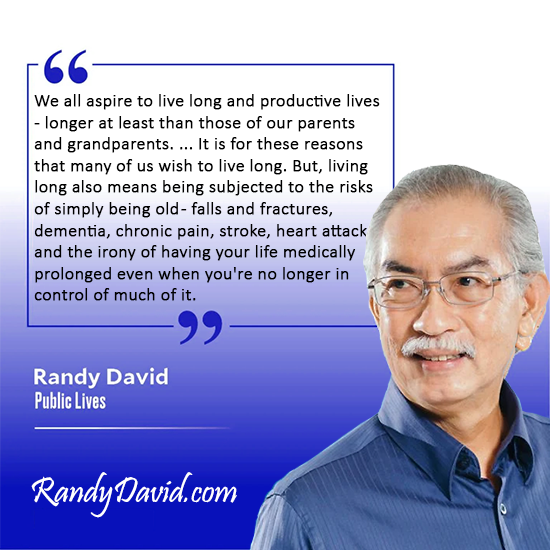
Like all baby boomers—the generation born shortly after the end of World War II—I am, at 77, of that age when the only time I run into old friends and acquaintances outside my immediate circle is at wakes and funerals. They are mostly the same people with whom I have reconnected through online chat groups, where the daily postings tend to be dominated by prayers, wishes for a successful operation and speedy recovery, health tips, birthday greetings, and condolences.
Though we sometimes exchange notes on how to navigate the perils of old age, the conversations are rarely about death itself. We all aspire to live long and productive lives—longer at least than those of our parents and grandparents. We hope to see our children reap the blessings of a successful career and a stable marriage, with enough money of their own to keep them from obsessing about inheritance. We hope to witness our country finally break free from poverty.
It is for these reasons that many of us wish to live long. But, living long also means being subjected to the risks of simply being old—falls and fractures, dementia, chronic pain, stroke, heart attack, and the irony of having your life medically prolonged even when you’re no longer in control of much of it.
A 2014 Atlantic Monthly article morbidly titled “Why I hope to die at 75,” which I have shared with some of my siblings, presents this dilemma rather provocatively. The author, Ezekiel J. Emanuel, a bioethicist and cancer specialist, explains: “But here is a simple truth that many of us seem to resist: Living too long is also a loss. It renders many of us, if not disabled, then faltering and declining, a state that may not be worse than death but is nonetheless deprived.”
I myself didn’t pay much attention to these issues until after I lost my wife Karina to chronic heart disease nearly four years ago. While she lived, I resisted the thought that the quality of her life had declined so much that she would have preferred to go sooner. We didn’t talk about death until just about a month before she quietly slipped away. “Please ask the doctor,” she told me one day, “how it typically ends for those in my condition.”
I read somewhere that people always feel much younger than their actual age. I guess that’s me on my motorcycle. But the other week, while on a short visit to Singapore, I suddenly felt old. We had taken a bus to go to Sunday Mass, and I unthinkingly followed my 11-year-old grandson Xavier as he headed for the bus’ upper deck. I didn’t have a problem going up the steep staircase. It was going down while the bus was slowly coming to a stop which proved challenging.
As I stood up from my seat, I struggled to keep my balance. Grasping the railings of the narrow stairwell, I missed two steps and landed on the platform with a thud loud enough to make the little boy look back and ask: “Are you all right, Lolo?” I wasn’t hurt but I felt shaken to the core. From the bus stop, my grandson instinctively took my hand to cross the street—in what felt like an ominous reversal of roles.
When I was Xavier’s age, my grandparents on my father’s side required repeated confinement at the University of Santo Tomas Hospital in Manila. My mother would sometimes bring me with her as she commuted from Pampanga to Manila to assist her in looking after them. My mother understood how hospitals worked: She took care of signing consent forms for medical procedures, negotiated professional fees, hired “special nurses,” and settled hospital bills. She listened patiently to the doctors to understand the nature of her in-laws’ health issues. In short, she became the chief “burden bearer” of my grandparents’ caregiving needs.
As my father and mother became old themselves, I saw how important it was for a family to know what the elderly needed and to plan ahead before anything happened to them. My father had cancer and died from multiple organ failure shortly before he turned 60. As none of us, his children, were earning enough at that point to help pay for his medical expenses, he had to take early retirement to secure the release of what remained of his meager government pension.
My mother outlived him by 18 years, and by the time she herself came down with end-stage kidney disease, we were far more prepared as a family to give her the care she needed. For the first time, I realized what a great advantage it was that there were 13 of us, plus our spouses, who were ready to share in the responsibility of giving this self-sacrificing and loving woman the best care she needed. But when she felt that dialysis was only prolonging her agony at great expense, she herself opted to discontinue all treatment, telling us to allow her to go peacefully.
Today, of the original 13 David siblings, 12 remain. With the exception of the youngest, all of us are senior citizens. It’s our turn to prepare for our own elderly years so that our children do not have to put their own lives on pause to care for us when the time comes. We have set up a small medical fund to help with the expenses of any family member who may require costly medical procedures and long-term nursing care. We have also started to talk of creating an affordable independent living facility for similarly situated relatives and friends.
But these are still family-oriented ideas that are consistent with the culture of caring found in multihousehold families. They are narrowly focused solutions to what is in reality a society-wide existential problem. We have to get a broader conversation going about what we as citizens of a caring society can do collectively to make the burdens of living long less heavy.
——————–
